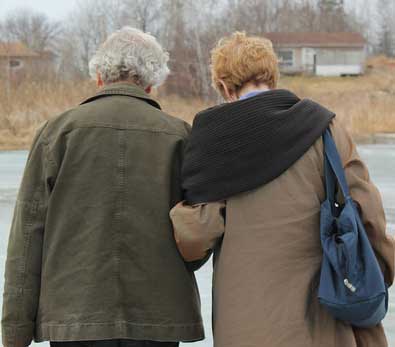rabble is expanding our Parliamentary Bureau and we need your help! Support us on Patreon today!
The Trudeau government has committed to cost-sharing a $30 million all-weather road for the Shoal Lake 40 First Nation. The province of Manitoba and city of Winnipeg had already agreed to contribute $10 million each to the construction of this road, but the previous federal government had refused to contribute to the project.
The Canadian Press reports, “[Indigenous affairs minister] Carolyn Bennett says the federal government is committed to seeing an all-weather road built to connect the Shoal Lake 40 First Nation to the mainland. The reserve on the Manitoba-Ontario boundary was cut off a century ago during construction of an aqueduct which carries fresh water to Winnipeg. …While clean water continues to flow to the Manitoba capital, the reserve of several hundred people has been under a boil-water advisory for 18 years. …A formal announcement is coming ‘in the near future,’ she said.”
The article adds, “In the summer, the First Nation depends on an aging ferry to get to the mainland, but the vessel failed government inspection this year. Residents use a treacherous ice road in the winter and people have died falling through the ice. Health-care workers and ambulances won’t risk going to the community and children have to leave the reserve to continue their education past Grade 8. A water treatment plant is prohibitively expensive without a road to transport construction equipment. Residents have long talked about the need for a ‘Freedom Road,’ which would be both a symbolic and concrete beginning to right the wrong done a century ago.”
Over the years, the Council of Canadians has helped to highlight the situation faced by this First Nation:
- In January 2013, we first outlined in a campaign blog the crisis being experienced by Shoal Lake 40 First Nation following a trip to Ottawa by their Chief Erwin Redsky.
- In July 2014, our Winnipeg chapter visited Shoal Lake 40. Chapter activist Linda Goosen wrote, “The Council of Canadians is committed to an ongoing relationship with Shoal Lake 40. We support them in their reasonable demand for an end to the century-long isolation imposed by the City of Winnipeg’s water infrastructure. Many lives have been lost and damaged by this man-made isolation, while Winnipeg has benefited and profited from the water. The community has a right to safe access and we would encourage those of us on the receiving end of Shoal Lake’s water, including all levels of governments, to work with Shoal Lake 40 to implement a just solution to this problem.”
- In April 2015, Maude Barlow visited Shoal Lake 40. She stated, “Canada is violating the human right to water in Shoal Lake 40 in order for Winnipeg to have access to safe drinking water. How did we let this happen?” At the time of Barlow’s visit there, the Winnipeg Free Press reported, “The Council of Canadians [has] issued a statement to put pressure on the city, the province and the federal government to push harder on Freedom Road. …It was posted on the Council’s website, along with a letter to the Prime Minister’s Office to press for action on behalf of the community.”
- In June 2015, two members of the Winnipeg chapter attended a ceremony at Shoal Lake 40. Chapter activist Ken Harasym read a statement on behalf of Barlow that highlighted, “The Canadian government must agree to end the century of isolation it forced on Shoal Lake 40, and join with the city of Winnipeg and the province of Manitoba to fully fund the construction of Freedom Road.”
Then, as the result of ongoing public mobilizations by Shoal Lake 40 and numerous allies, the Liberals pledged during the federal election “to fund the federal portion of the construction of ‘Freedom Road’ for the Shoal Lake 40 First Nation.” The Council of Canadians congratulates the Trudeau government on its stated commitment to follow through on that promise.
We further call on the government to support the provision of a water treatment plant for Shoal Lake 40, particularly given the community has been under a boil water advisory for the past 18 years. During the election Trudeau promised to end boil water advisories on all First Nations within five years, but that pledge has been noticeably absent from his Dec. 8 speech to the Assembly of First Nations, the Dec. 4 Speech from the Throne, and his Nov. 13 mandate letter to the Minister of Indigenous Affairs. We trust that the government is still firmly committed to this promise and that we will see substantial funding for this in the 2016 federal budget expected this coming March-April.
And we call on the Trudeau government to reject the Energy East pipeline. Council of Canadians energy and climate justice campaigner Andrea Harden-Donahue has written, “The 1.1 million barrels per day pipeline path runs alongside Falcon Lake and near High Lake, which straddles the Manitoba-Ontario border. Both small lakes drain into Shoal Lake, which supplies Winnipeg’s residents with their drinking water. A spill in this area would further compound the water issues being faced by Shoal Lake 40 First Nation.” It would be a bitter irony to build Freedom Road only to place Shoal Lake’s drinking water in jeopardy with a pipeline.
rabble is expanding our Parliamentary Bureau and we need your help! Support us on Patreon today!




